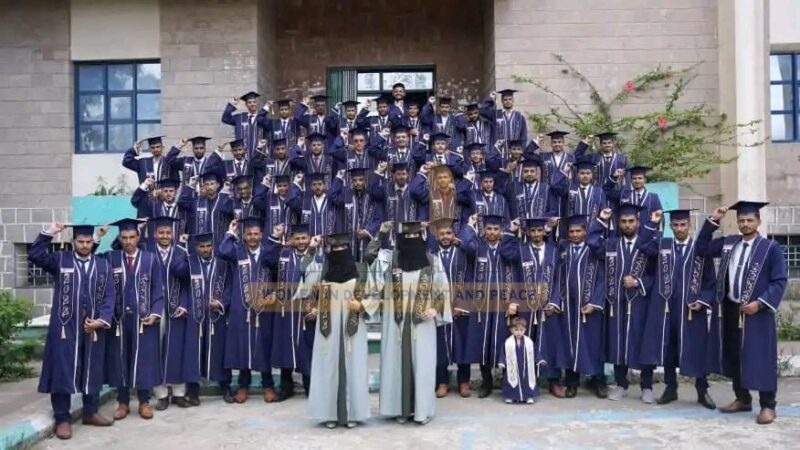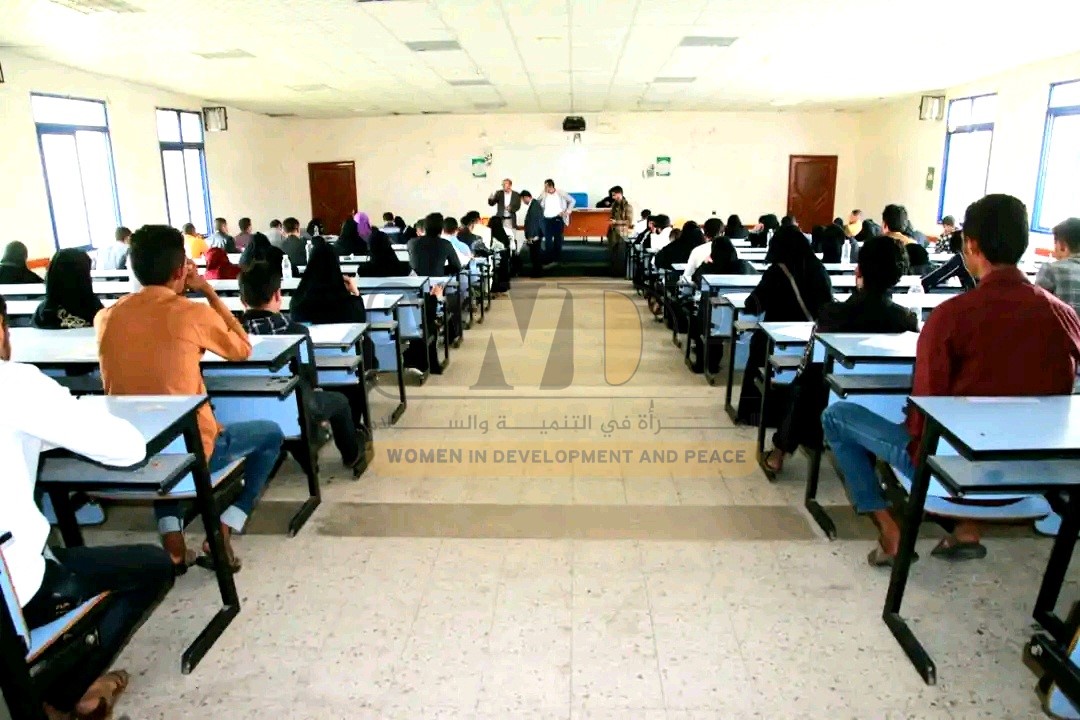Alia Mohammed – Women in Development and Peace
The ongoing conflict in Yemen, which has lasted for nearly a decade, has significantly impacted all aspects of Yemeni society, particularly social, economic, and educational conditions. This impact has extended to higher education and scientific research, casting a shadow over the reality of women in this field. It has led to a noticeable decline in female university students due to the deterioration of educational infrastructure, worsening security conditions, and increasing economic hardships.
The conflict has also affected academics in Yemen, both male and female, due to the deterioration of living conditions and the repercussions of the conflict, which has heavily impacted their scientific performance and negatively affected the quality of education and scientific research in Yemen.
Academic Nadia Al-Kawkabani believes that the conflict profoundly impacts the reality of education in Yemen in general, and higher education and female academics in various universities.
She stated: “The conflict has created a state of instability, which has generated an anxious environment not conducive to achieving any achievement or development in the field of research and studies. It has led to a focus on preparing to teach subjects without developing them or searching for new developments in various disciplines that are supposed to keep pace with global modernization standards.”
She added that the difficult economic conditions and the interruption of salaries have led to a decline in the participation of female academics in higher education, as some academics have become preoccupied with searching for sources of livelihood for themselves and their families. As a result, many of them have become preoccupied with this search, neglecting development in the field of scientific research or even scientific reading to keep pace with new developments.
She pointed out in her speech that some academics are forgoing some of the requirements of specialized subjects required of students, such as research, models, field visits, and conducting scientific questionnaires, due to the difficult financial situation and the deteriorating economic conditions. These factors have resulted in an inability to pay subscription fees or publication fees for scientific research in refereed scientific journals.
She also indicated that the laws preventing academics from working in more than one university under the current circumstances in Yemen have placed an additional burden on them. This has prompted many of them to seek additional job opportunities, as academics may not find other suitable job opportunities for their experience and qualifications, pushing them to look for any available work.
In a related context, Dr. Khalil Al-Khatib says: “Yemen is witnessing dire conditions, which are sufficient to create several challenges and difficulties for all segments of society, including female academics who have faced diverse and continuous challenges from the beginning of their university enrollment and even at the level of their work.
Instability and Insecurity
The ongoing conflict and current situation in Yemen have led to instability in many areas. Numerous universities have been forced to close their doors, disrupting education for extended periods. This has compelled many families to prevent their daughters from pursuing higher education out of concern for their safety.
Sumayya Qaid, a researcher and academic, emphasizes that Yemeni women have achieved leadership in research and scientific development, driving positive change in pursuing knowledge and science over the years. She highlights that the scientific landscape in Yemen before the conflict was more conducive to success. Advanced research centers facilitated groundbreaking scientific projects, fostering hope for the advancement of scientific research and women’s leadership in the field.
However, Qaid points out that the conflict has significantly degraded the infrastructure of scientific institutions. Consequently, financial support for higher education and its development has dwindled, leaving female researchers facing formidable challenges due to the lack of security and stability. Furthermore, the hostilities during the conflict have destroyed numerous laboratories and research centers. Scientific research institutions in Yemen are now grappling with a scarcity of funding, material resources, and the necessary infrastructure to conduct research. This dire situation has forced many talented academics and researchers to flee the country, seeking refuge from the turmoil. This departure of talent has significantly weakened the research base in Yemeni universities and scientific centers.
Qaid further explains that the detrimental impact of the conflict extends beyond higher education, significantly affecting scientific research as well. A marked decline in the participation of female researchers in conferences and scientific endeavors, both nationally and internationally, has been observed.
Displacement and Poverty
Yemen is currently facing a humanitarian crisis as a result of the ongoing conflict. Countless families have been displaced from their homes, seeking refuge in other areas. This displacement, coupled with the deteriorating economic conditions faced by Yemeni families, has created a significant barrier for women aspiring to pursue higher education.
Numerous reports indicate a noticeable decline and regression in higher education due to displacement and poverty. Many young women are forced to abandon their studies and enter the workforce prematurely to support their families and meet their basic needs.
The National Women’s Committee, in its 2022 report on the Status of Yemeni Women, stated that the repercussions of the conflict have had a profound impact on students in general, and female students in particular, hindering their ability to continue their education.
The report highlighted that both public and private higher education institutions have been disproportionately affected by the widespread displacement, transportation difficulties, soaring prices, and dwindling job opportunities. The conflict has negatively impacted all levels of education, exacerbating pre-existing weaknesses and imbalances within the higher education sector.
Marwa Nasir, a university student who was unable to complete her studies due to displacement and her family’s deteriorating living conditions, shares, “The conflict has deprived me of completing my higher education because my family can no longer afford the expenses.”
She adds, “Amidst the suffocating humanitarian crisis in Yemen, the role of higher education is diminishing, especially for girls. With the increasing rates of displacement and poverty, families are unable to cover the costs of university education, depriving many girls of achieving their academic aspirations.”
Marwa also points out that the economic crisis has forced many families to marry off their daughters at an early age to alleviate their financial burden. This practice denies countless girls the opportunity to complete their university education. Consequently, many young women are opting to seek employment instead, aiming to support their families and improve their income.
Solutions and Interventions
Despite playing a prominent role in various fields and disciplines within higher education amidst the current circumstances, Yemeni women still require substantial support to empower them and realize their academic aspirations. This necessitates a concerted effort from both governmental and societal entities to safeguard their right to education and provide a conducive environment for their advancement and the achievement of their academic goals.
Achieving this requires the implementation of programs and strategies that focus on Improving the infrastructure of universities and research centers in Yemen, including maintaining and developing educational buildings and facilities to meet modern standards, and establishing workshops equipped with advanced tools and technologies. In addition to strengthening Human Resources, Ensuring the continuity of education and research processes by:
– Implementing development and training programs for faculty members and researchers, with a particular focus on female researchers.
– Fostering international collaboration and academic exchange to facilitate knowledge transfer, share expertise, and attract distinguished scientific and academic talent, especially women.
– Developing and updating academic programs and curricula to keep pace with modern scientific and technological advancements.
Funding and financial support for higher education institutions are crucial steps towards advancing women’s access to higher education. This can be achieved by allocating a dedicated budget for higher education and scientific research by the government. Encouraging the private sector to contribute to funding research and innovation projects, collaborating to align research with developmental needs. Also actively seeking external funding from international organizations and donor agencies.
Implementing these steps in an integrated manner will contribute to strengthening the infrastructure, providing the necessary resources to develop higher education and scientific research, and ensuring that Yemeni women have access to greater educational opportunities.


